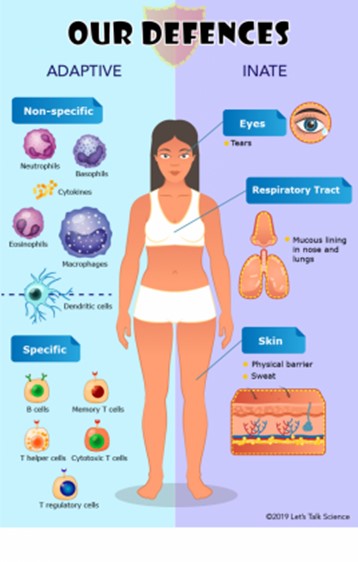Which organ in the human body is responsible for the removal of damaged red blood cells and the production of certain types of white blood cells?
Spleen.
Kidneys.
Pancreas.
Thyroid gland.
The Correct Answer is A
The spleen is an organ in the human body that is responsible for the removal of damaged red blood cells and the production of certain types of white blood cells.
Choice B is incorrect because the kidneys are responsible for filtering waste from the blood and regulating electrolyte balance.
Choice C is incorrect because the pancreas produces hormones and enzymes that aid in digestion.
Choice D is incorrect because the thyroid gland produces hormones that regulate metabolism.
Nursing Test Bank
Naxlex Comprehensive Predictor Exams
Related Questions
Correct Answer is C
Explanation
Innate immunity represents the first line of defense to an intruding pathogen.
The innate immune system is a series of nonspecific defenses that make up the innate immune system.

These defenses are not directed against any one pathogen but instead provide a guard against all infection.
Choice A is incorrect because adaptive immunity is activated when pathogens are able to bypass innate immune defenses.
Choice B is incorrect because antibodies are part of the adaptive immune system and are produced by B cells.
Choice D is incorrect because T cells are part of the adaptive immune system and assist B cells or directly kill infected cells.
Correct Answer is C
Explanation
During hemodialysis, waste products and excess fluids are removed from the blood by diffusion 1.
Diffusion is a separation process in which particles that are dissolved in a solution are relocated from an area of higher concentration in the blood to an area of lower concentration in the dialysate.
Choice A.
Active transport is incorrect because active transport is a process that uses energy to move molecules against a concentration gradient.
Choice B.
Osmosis is incorrect because osmosis is the movement of water molecules across a semipermeable membrane from an area of higher water concentration to an area of lower water concentration.
Choice D.
Facilitated diffusion is incorrect because facilitated diffusion is a process where molecules move down their concentration gradient with the help of carrier proteins.
Whether you are a student looking to ace your exams or a practicing nurse seeking to enhance your expertise , our nursing education contents will empower you with the confidence and competence to make a difference in the lives of patients and become a respected leader in the healthcare field.
Visit Naxlex, invest in your future and unlock endless possibilities with our unparalleled nursing education contents today
Report Wrong Answer on the Current Question
Do you disagree with the answer? If yes, what is your expected answer? Explain.
Kindly be descriptive with the issue you are facing.
